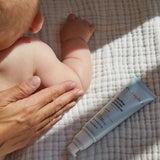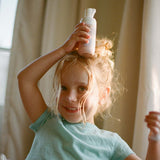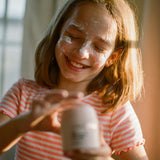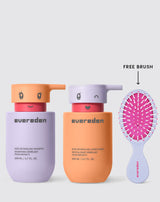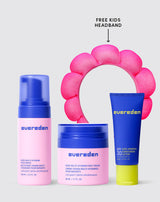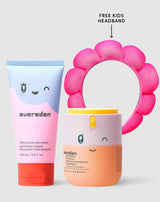Did you know that eczema affects over 31 million Americans? The skin condition, which leads to dry, itchy, and cracked skin, is more common than you think and often begins in childhood. In honor of Eczema Awareness Month, we asked two of our own Moms in Medicine, Dr. Joyce Teng and Dr. Sarina Elmariah, to break down everything you need to know about the causes of eczema and how you can safely manage symptoms for your little ones.
WHAT CAUSES ECZEMA?
Eczema is often considered a genetic condition, but it can also be triggered by a number of environmental factors that cause the skin barrier to break down. “Babies’ faces are commonly aggravated by factors such as drool, weather, and irritants from what they place in their mouths,” says Dr. Sarina Elmariah, Evereden Scientific Officer and Professor of Dermatology at Harvard Medical School. When the skin barrier becomes weak or impaired, irritants and allergens enter the body and activate the immune system, triggering skin irritation and inflammation. Here are a few common eczema triggers:
- Fragrances in products that come into contact with the skin, particularly synthetic fragrances. It’s one of the reasons we offer fragrance-free formulas in addition to formulas that use only 100% natural fragrances.
- Foods that contain gluten, eggs, fish, peanuts, citrus fruits, soy, and dairy may cause eczema flares.
- Fabrics that are itchier and rougher on the skin, like wool, polyester, rayon, and nylon can further irritate eczema-prone skin. In an effort to soothe an eczema outbreak, the National Eczema Association recommends wearing soft, breathable, natural clothing close to the skin.
- Pet dander is another factor that can contribute to increased discomfort and eczema flare-ups.
- Changes in weather also play a role. The drier the air, the drier the skin can become, which can break down the skin barrier and cause a flare-up. Rich moisturizers are a must in dry environments and seasons. In the winter, a humidifier can help keep the air in your little one’s room from becoming too dry.
WHAT CAN YOU DO ABOUT IT?
The key to treating eczema is restoring and protecting the skin barrier. Think of it like this: the skin barrier is the first line of defense. If you can keep it strong and healthy, those allergens and irritants can’t penetrate, which means they can’t activate an immune system response. "Regular and early moisturization of baby's skin using clean lotion products is important,” says Dr. Joyce Teng, Evereden’s Chief Scientific Officer and Director of Pediatric Dermatology at Stanford Medical school. “If we pay attention to skin barrier protection as early as three weeks, it can reduce the risk of developing eczema and skin allergies by 50%.”
Look for products with nourishing, calming ingredients, like sunflower seed oil. This antioxidant-rich superfood oil is the star ingredient in our formulas and for good reason: it’s known to help strengthen the skin barrier. “There’s no ingredient I love more than sunflower seed oil because of its amazing ability to hydrate and strengthen the skin barrier,” says Dr. Teng. She also points out that it’s the most widely used natural ingredient for children worldwide.
Our Nourishing Baby Face Cream is made with safe, all-natural ingredients suited to your baby’s delicate facial skin. With cold-pressed, organic sunflower seed oil, grapeseed oil, and jojoba oil, it’s rich yet easily absorbed into skin. “[It’s] safe and clinically proven to strengthen skin’s moisture barrier and hydrate for 72 hours*,” says Dr. Teng. "It’s an essential part of whole skin health.”
Our Kids Multi-Vitamin Face Cream is another great option when it comes to strengthening and protecting your little one’s skin. It’s formulated with our signature MegaVitamin Complex, a barrier-strengthening blend of amino acids, probiotics and omegas, plus cold-pressed sunflower seed oil.
Still have questions about eczema and your little one’s skin? Reach out to your dermatologist for a complete skin assessment.
Shop Nourishing Baby Face Cream and Kids Multi-Vitamin Face Cream, to help strengthen and protect your little one’s skin.
*Based on a 72-hour clinical study with 22 subjects aged 22-67.



.jpg?v=0)
